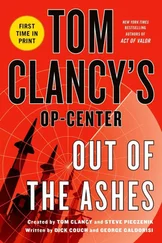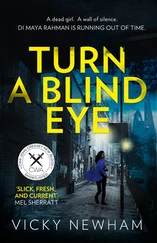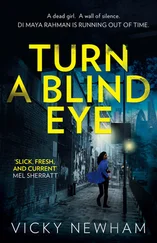PRAISE FOR VICKY NEWHAM
‘An impressive debut … the multicultural community of Brick Lane is sensitively evoked and the heroine is ultra-hip’
Daily Mail
‘The first in a promising series … a female detective who has to negotiate cultural conflicts on a daily basis’
The Sunday Times
‘Slick, fresh and current’
Mel Sherratt
‘A remarkable portrayal of crime in modern, multicultural Britain’
Paul Finch
‘DI Maya Rahman is the heroine I’ve waited a lifetime for’
Alex Caan
‘A sensational debut; a current, timely police procedural featuring a DI like none you’ve ever seen’
Karen Dionne
‘A terrific start to an important new series’
Vaseem Khan
‘[DI Maya Rahman] is wonderfully complex and human, and the tension ratchets up nicely’
James Oswald
‘Clever, passionate and hugely thought provoking’
Lizlovesbook.com
VICKY NEWHAMgrew up in West Sussex and taught Psychology in East London for many years, before moving to Whitstable in Kent. She studied for an MA in Creative Writing at Kingston University, where she graduated with distinction. She is currently working on the next instalment in the DI Rahman series.

Copyright

An imprint of HarperCollins Publishers Ltd
1 London Bridge Street
London SE1 9GF
First published in Great Britain by HQ in 2019
Copyright © Vicky Newham 2019
Vicky Newham asserts the moral right to be identified as the author of this work.
A catalogue record for this book is available from the British Library.
This novel is entirely a work of fiction. The names, characters and incidents portrayed in it are the work of the author’s imagination. Any resemblance to actual persons, living or dead, events or localities is entirely coincidental.
All rights reserved under International and Pan-American Copyright Conventions. By payment of the required fees, you have been granted the non-exclusive, non-transferable right to access and read the text of this e-book on-screen. No part of this text may be reproduced, transmitted, downloaded, decompiled, reverse engineered, or stored in or introduced into any information storage and retrieval system, in any form or by any means, whether electronic or mechanical, now known or hereinafter invented, without the express written permission of HarperCollins.
Ebook Edition © May 2019 ISBN: 9780008240738
For my father, who I miss every day.
Contents
Cover
PRAISE
About the Author
Title Page
Copyright
Dedication
FRIDAY
Rosa, 2 p.m.
Maya, 2.30 p.m.
Maya, 3.30 p.m.
Maya, 3.45 p.m.
Dan, 3.45 p.m.
Maya, 4 p.m.
Maya, 4.30 p.m.
Maya, 5.30 p.m.
Maya, 6 p.m.
Maya, 6.15 p.m.
6.30 p.m.
Maya, 7.30 p.m.
Maya, 7.45 p.m.
Brick Lane, 1984 – Maya
SATURDAY
Maya, 7 a.m.
Maya, 8.30 a.m.
Maya, 8.45 a.m.
Maya, 9.15 a.m.
Maya, 10 a.m.
10.30 a.m.
Dan, 11 a.m.
Maya, midday
Maya, 12.30 p.m.
Maya, 1 p.m.
Maya, 1.30 p.m.
Dan, 2.30 p.m.
Dan, 3 p.m.
Maya, 3.30 p.m.
Maya, 4.30 p.m.
Maya, 5.30 p.m.
Dan, 6 p.m.
Maya, 6.45 p.m.
Maya, 7.30 p.m.
Maya, 8.30 p.m.
Dan, 9.30 p.m.
Maya, 10 p.m.
Maya, 10.45 p.m.
11.30 p.m.
Maya, 11.30 p.m.
Maya, midnight
SUNDAY
Rosa, 7 a.m.
Brick Lane, 1984 – Maya
Maya, 8.30 a.m.
9 a.m.
Maya, 9.30 a.m.
Maya, 11 a.m.
Dan, 12.30 p.m.
Maya, 12.30 p.m.
Dan, 2.30 p.m.
Maya, 5 p.m.
Maya, 9 p.m.
Feldman’s Newsagent’s, Brick Lane, 1989 – Maya
MONDAY
8 a.m.
Maya, 8.30 a.m.
Maya, 9 a.m.
Dan, 10.30 a.m.
Maya, 10.30 a.m.
Dan, 11.15 a.m.
Maya, 11.15 a.m.
Maya, midday
Maya, 1 p.m.
Dan, 1.55 p.m.
2 p.m.
Maya, 3 p.m.
Maya, 4 p.m.
Maya, 6 p.m.
Maya, 7 p.m.
Maya, 8 p.m.
Maya, 8.45 p.m.
Maya, 10 p.m.
Maya, 10.30 p.m.
TUESDAY
Dan, 1 a.m.
Maya, 7.30 a.m.
Maya, 9 a.m.
Maya, 10.30 a.m.
Maya, 11.30 a.m.
Maya, 12.30 p.m.
Maya, 2.30 p.m.
Maya, 4 p.m.
Maya, 5 p.m.
WEDNESDAY
Maya, 8 a.m.
Maya, 9 a.m.
Maya, 10 a.m.
Acknowledgements
About the Publisher
FRIDAY
Rosa, 2 p.m.
Rosa Feldman stood at the door of her Brick Lane newsagent’s, staring out at the street she’d known since she was four. She couldn’t shake the feeling that something was wrong. It was the shop opposite, run by the young Lithuanian couple. Since first thing this morning, the lights had been off and the shutters down. Initially, she was relieved that for once, the ugly neon sign, with its air of Margate or Blackpool, wasn’t flashing outside her bedroom window, but as the morning progressed, she felt increasingly uneasy.
It wasn’t like them at all.
She couldn’t recall ever seeing the shop closed in the daytime.
A tap on the glass snapped Rosa back into the afternoon. It was Mr Walker from the off-licence a few doors down. He shouted a cheery greeting and waved as he passed the window. Regular as clockwork, off to get chips for tea. Rosa raised her hand to return the gesture, but the pain in her wrists and knuckles bit again. Damned arthritis.
Mr Walker’s knock was usually her reminder to think about their meal. Today was Friday after all. But without Józef, the Sabbath meal wasn’t the same and she didn’t bother with the rituals any more. In the last year, she’d lost weight and clothes hung off her spare frame. What was the point of lighting candles when there was only one of you? She’d steam a plate of yesterday’s chicken and potatoes. That would do her. Fortunately, she didn’t have to go far to get home, just upstairs to the flat, even if it was still freezing at this time of year.
Over the dusty window display, two men were putting a new shop sign up where Rosenberg’s jewellers used to be. Work had been going on for weeks, and it looked like the place was nearly ready to open. Alchemia , it said. A swanky new Polish bar by the looks of it, slap bang next-door to Mr Hamid’s curry house. He wasn’t going to be happy. So much had changed in Brick Lane since she and her family had arrived, and life moved so fast on the other side of the window, it made Rosa dizzy. The pace was relentless and the change uncompromising. Inside the shop, though, she felt safe. Change there was slow and predictable. Above her head, by the door, the fan heater droned noisily and made little impact on the chilly air, but she didn’t mind. It had always done that. And she barely noticed the crumbling plaster of the ground floor walls, or the mildew which clung to ceiling corners like a nasty rash.
Her thoughts slid back to the shop over the road. The place was usually open all hours of the day and night, selling its fancy five-quid soups to whoever could afford them. She had no objection to people earning a living, but her parents would be turning in their graves. They’d survived the Ghetto on two hundred calories a day. When they left Warsaw, and arrived in London, it was the handouts from the Jewish soup kitchen in Brune Street that kept them alive. It was extraordinary to think that what had been humble subsistence for many families was now a fad-food. She’d been over for a spy at the menu, of course, when they were shut. Apart from some matzo ball soup, she couldn’t find much she fancied and didn’t know what most of it was, let alone how to pronounce it. Keen-war, or something, a youth with a bicycle and a dog had told Rosa.
Читать дальше














